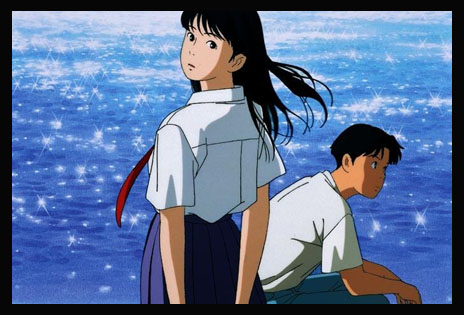
Ocean Waves (Umi ga Kikoeru), sometimes translated as “I Can Hear the Sea” (1993), is Studio Ghibli‘s only TV special. A modest work that’s closer in scope and tone to Whisper of the Heart or From Up on Poppy Hill than to the fragile poetry of The Tale of Princess Kaguya or the grand adventures of Princess Mononoke and Spirited Away, Ocean Waves was the first Ghibli film not directed by either Hayao Miyazaki or Isao Takahata. Rarely seen outside of Japan, it was designed to offer the younger staff members a chance to make a smaller film on a more limited budget.
Told through a series of interlocking flashbacks, the story centers on an awkward high school romantic triangle. Although they’re in different classes, Taku Morisaku (voice by Nobuo Tobita) and Yutaka Matsuno (Toshiko Seki) have been best friends for years. Complications arise when Rikako Muto (Youko Sakamoto) transfers from Tokyo to their school in Kochi, a small city in southern Shikoku.

As a class officer, Yutaka shows her around the school and immediately falls for her. Taku is less taken with her—or so he thinks. But when she begins requesting (or demanding) loans and favors, he complies instantly. During the class trip to Hawaii, Rikako loses her spending money and borrows ¥60,000 (about $500 today) from Taku, money he’s earned as a busboy, a job that’s taken a toll on his grades.
Rikako came to Kochi with her mother when her parents divorced. She misses her father and her more sophisticated life in Tokyo. When she lures her only friend into a plan to sneak off to Tokyo, Taku saves the day. He goes with her, tries to make peace and even sleeps in the bathtub at the hotel to ensure her comfort.
Although she’s one of the top students in the school, an ace tennis player and very pretty, it’s not clear why Yutaka and Taku are so smitten with her. She’s cold, rude and arrogant. She makes fun of the rural Kochi dialect, which she compares to the period speech in a samurai film. She remains aloof from her classmates and fights with the girls in her class. Ultimately, Taku and Yutaka come to blows over her. More than a year later, at a class reunion, the two friends bury the hatchet and Taku admits he was always crazy about Rikako.

Keiko Niwa’s screenplay, based on a book by the popular novelist Saeko Himuro, presents director Tomomi Mochizuki with some awkward challenges. The complicated flashback structure sometimes make its difficult to tell what occurred when, problems a more experienced director might have handled more deftly.
The story is told with an appealing warmth, but it suffers from a lack of depth. Taku and Yutaka are standard-issue anime high school boys; they fail to emerge as strongly delineated individuals. In contrast to Shizuku in Whisper or Umi in Poppy Hill, Rikako is not a likeable character. Her imperiousness anticipates Haruhi Suzumiya at her worst, but the script doesn’t give her anyone to provide comic relief, as Haruhi’s friends do. The rather limited animation does little to enhance characters’ personalities. However, the handsome watercolor backgrounds bear the stamp of Ghibli’s talented artsits.
Despite these caveats, anyone interested in the history of Studio Ghibli will want to see Ocean Waves, which screens on January 12th at the American Cinematheque in Los Angeles as part of a limited theatrical run. Gkids has announced plans for a home video release in the spring.
- Charles Solomon’s Animation Year End Review 2023 - December 28, 2023
- INTERVIEW: Makoto Shinkai on “Suzume” - November 27, 2023
- Interesting Portrayals of Gay Men in Manga/Anime - June 12, 2023


 January 10th, 2017
January 10th, 2017  Charles Solomon
Charles Solomon  Posted in
Posted in  Tags:
Tags: 






